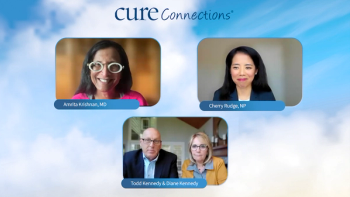Articles by Cherry Rudge, NP

Panelists emphasize the importance of multidisciplinary collaboration, patient education, and advocacy in managing multiple myeloma, while expressing optimism about emerging therapies like CAR T cells that offer deeper remissions and improved quality of life.

Panelists highlight advances in myeloma treatment, focusing on innovative T cell therapies like CAR T and T cell engagers, along with potent new CELMoD drugs, all offering more targeted and effective options for patients.

Panelists discuss City of Hope’s collaborative partnership with community physicians, emphasizing expert evaluation at specialized centers while enabling ongoing treatment closer to home for convenience, coordinating common therapies like Daratumumab locally, reserving complex procedures such as stem cell transplants and clinical trials for specialized centers, and aiming to balance high-quality care with patient accessibility through integrated, personalized, and coordinated management across care settings.

Panelists discuss City of Hope’s multidisciplinary approach, highlighting pharmacists providing medication guidance, social workers offering emotional support, and palliative care specialists managing symptoms, while consultants like cardiologists and infectious disease experts address specific health issues to ensure coordinated, personalized care; complementary therapies such as acupuncture and mindfulness help manage side effects like neuropathy, and support groups foster community and resilience among patients and caregivers throughout their myeloma journey.

Panelists share that despite initial emotional challenges, multiple myeloma treatment with targeted combination therapies was generally well tolerated, with manageable side effects—especially after adjusting dexamethasone—and strong healthcare team support enabling patients to maintain quality of life and continue regular activities throughout therapy.

Panelists discuss how patient portal use improves communication by allowing patients to report side effects with photos for accurate evaluation, and how treatment effectiveness is monitored through carefully timed blood tests, imaging, and bone marrow biopsies—including minimal residual disease testing—to balance thorough assessment with minimizing patient discomfort.

Panelists discuss how patients newly diagnosed with multiple myeloma often face emotional and informational overload, but collaborative, personalized care—including early access to cutting-edge four-drug regimens, clear communication, and shared decision-making—can empower them, ease anxiety, and support long-term remission and quality of life.

Panelists discuss how preparing multiple myeloma patients for treatment involves structured education, emotional support, and proactive symptom management—emphasizing clear communication about the four-drug regimen, logistics, and supportive care to empower patients and ensure safety throughout their treatment journey.

Panelists discuss how treatment decisions in multiple myeloma are guided by disease risk, patient health, and evolving clinical data—highlighting the shift toward a comprehensive, multi-phase approach that begins with a four-drug induction regimen and stem cell transplant, as supported by the Perseus Trial’s promising long-term remission outcomes.

Panelists discuss the emotional and diagnostic journey of a multiple myeloma patient and his care partner, highlighting how incidental back pain led to an unexpected cancer diagnosis, the initial shock and fear that followed, and the pivotal role of expert care, accurate information, and community support in finding hope and navigating the disease.

Panelists highlight that being a care partner is one of the most challenging roles, requiring emotional resilience, coordination, and support, and emphasize the importance of viewing it as a true partnership that addresses both patient and caregiver well-being throughout the cancer journey.

Panelists discuss the multifaceted diagnostic process for multiple myeloma, emphasizing the integration of blood tests, genetic and imaging assessments, and patient education to guide personalized treatment planning and enhance patient engagement in care.

The program emphasized the importance of incorporating patient and caregiver perspectives alongside clinical expertise to support personalized, empathetic care and shared decision-making in managing the diverse and complex challenges of multiple myeloma.

